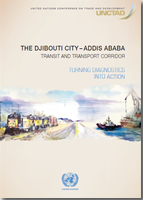
Under the Enhanced Integrated Framework, a joint effort by international organizations to bring together resources to help the world’s least developed countries use trade to enhance economic growth and reduce poverty, UNCTAD was assigned to prepare Diagnostic Trade Integration Study updates for Djibouti and Ethiopia. Both updates have been presented and validated.
UNCTAD noted that the challenges and opportunities related to trade policy, trade facilitation, and transport components of the diagnostic studies for Ethiopia and Djibouti could only be properly addressed through a subregional approach to make the trading environments of both countries more efficient. It was noted that if the Ethiopia-Djibouti corridor, as the main trade artery for both countries, functions with increased efficiency, that will bring significant benefits to both nations.
Landlocked Ethiopia needs a liberal trade policy and an efficient and reliable transport and logistics network if it is to meet the targets of the country’s Second Growth and Transformation Plan. The targets include expansion of the manufacturing sector, value-addition in all productive sectors, and a three-fold increase in the values of exports. Currently, opportunities created by Ethiopia’s lowcost inputs (labour and energy) are cancelled out by factors relating to trade logistics. For example, the labour costs of making a T-shirt in Ethiopia are onethird those of China, but the logistics expenses of exporting the T-shirt mean that the Ethiopian-made shirt sells for the same price as a Chinese shirt on international markets.
Ethiopia’s growth strategy has been driven by a massive public investment programme which reached almost a quarter of the country’s gross domestic product in 2014 and has accounted for around half of all growth in the economy since 2011. Spending on roads has been about 4 per cent of GDP every year over the last five years, and the Addis Ababa-Djibouti Railway has cost Ethiopia about $3.4 billion. However, without this expenditure on infrastructure there would be limited scope for improving logistics, and without such progress, Ethiopian manufacturers and other producers will not be price-competitive in most regional and international markets. The Ethiopia- Djibouti corridor provides Ethiopia’s only significant commercial access to the sea.
The Port of Djibouti has, since 1998, handled almost all of Ethiopia’s maritime traffic. To accommodate this, the port has invested in providing improved trade and transit facilities. Djibouti has invested just under $900 million in its portion of a standard gauge railway connecting the port with Addis Ababa. It also has invested heavily in new port infrastructure, as it is a shareholder of the Doraleh Container Terminal (of which the firm DP World is the other shareholder and manager) and is the main shareholder and manager of the Doraleh Multi-Purpose Port. With the railway and these new port facilities in Djibouti, Ethiopia will be able to channel more cargo through Djibouti, and Djibouti will be able to handle this additional traffic.
The present study is the culmination of a series of activities to implement the actions (terms of reference) agreed on and to prepare a project proposal for the establishment of a management authority for the Djibouti-Ethiopia corridor.



